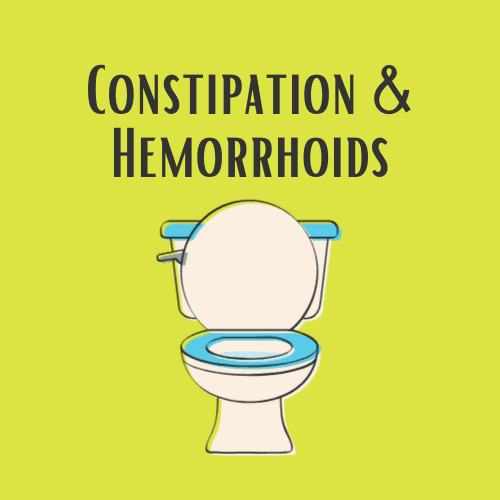Constipation and Hemorrhoids
Friday September 1, 2023

Let’s talk about two potential health issues that are common for adults with dementia: constipation and hemorrhoids. File this one under the category of “things you wish you didn’t have to know so much about, but you do because you’re a caregiver.”
Constipation
Constipation is usually defined as having three or fewer bowel movements a week. A healthy person should have at least three per week, and the normal range is anywhere from three per week to three per day. Chronic constipation is when a person has three or fewer bowel movements a week, persisting for several weeks.
While most healthy adults know when they are constipated, your loved one might not know or might not be able to communicate with you that they are constipated. You may only become aware of the situation when it becomes severe.
And don’t think that because your loved one has small bouts of diarrhea they are not constipated. At times, loose stool can work its way around an impaction.
Unfortunately, constipation is a side effect of many medications. Be aware of the potential side effects of your loved one’s prescriptions or over-the-counter medications so that you can be proactive. Other causes of constipation are a low-fiber diet, little to no daily exercise, and dehydration (Check out our Dehydration blog for more info). Being an older adult also increases your risk of becoming constipated.
Chronic constipation can cause all sorts of complications. Someone with dementia may strain and get hemorrhoids. Anal fissures (skin tears) can occur. Eventually, fecal impaction may occur, which can require a hospital visit. Constant straining can also cause a vagal episode. Your loved one loses consciousness, and this increases fall risk.
What do you do when your loved one is constipated? While over-the-counter medications may help, most stool softeners and laxatives work by drawing extra fluid into the bowel to push the feces through, so if your loved one is dehydrated, these medications will not work. It is best practice to clear over-the-counter medications with your loved one’s physician before use.
How to Prevent Constipation and Ease Symptoms
Increase fluids.
- Ensure milkshake – mix Ensure with ice cream in a blender
- Smoothies – mix ice, liquid, and fresh fruits/vegetables with high water content or frozen fruits/vegetables and liquid (could mix in sherbet as well)
- Water-rich fruits and vegetables – strawberries, melons, papaya, apples, tomatoes, cucumber, lettuce, celery
- Broth – bone broth is the most nutritious, but could offer low-sodium vegetable or chicken
- Electrolyte replacement – Liquid IV powder and water, Pedialyte, Gatorade, Powerade
Limit caffeine.
Increase physical activity.
The current recommendation is 150 minutes per week spread out over five days per week. Walking is good enough!
Increase fiber.
Offer fruits and vegetables with their skin, whole wheat foods, bran, and beans. Decrease processed food and dairy.
Be aware during bathroom visits.
Create a schedule throughout the day to encourage your loved one to use the restroom. If you’re tracking intake and output, you will know if your loved one needs more fluids or may be constipated. Look for hard, small stool and/or blood in the stool, and listen for straining.
Hemorrhoids
Hemorrhoids are swollen veins in the anus or lower rectum. They can be a long-standing issue and may be unavoidable for your loved one. They can be treated at home, but if they are not getting smaller or there is a large clot that you can feel or see, it may need to be removed by a doctor.
How to Treat Hemorrhoids
Use a sitz bath.
It’s helpful to do a sitz bath several times a day for 10 to 15 minutes at a time. You can get a kit to put on top of toilet seat, so your loved one doesn’t have to step down into a bath. You can buy these at any pharmacy store. And here is one on Amazon.
Use Preparation H wipes, cream, or suppositories for pain.
Increase fiber in the diet.
Remind your loved one not to strain before or during a bowel movement.




